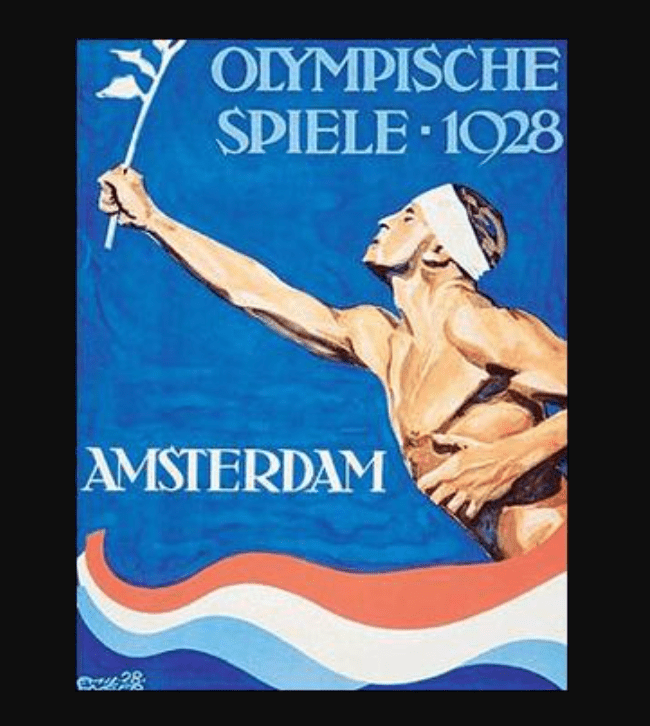2024 is an Olympic year!
The Olympic games are the ultimate in reality TV. Even if you're not a sport aficionado, you might find that the human element, the elation and the inevitable heartbreak, will cause you to tune in. As much as I like to see who wins the gold, I'm interested in the people who work so hard to follow their dreams.
The very first "Official" Summer Olympics were held in Amsterdam, Netherlands in 1928. The games showcased a wide range of sports events and achievements, bringing together athletes from different countries to compete for the first time on an international stage. (In a future blog, I'll talk about the use of the word Olympics which only involved women ~ très intéressant!)
The Amsterdam Olympics of 1928 holds a special place in the historical Olympic Games, serving as a catalyst for future summer Olympics and leaving a lasting impact on the world of sports. The city of Amsterdam provided a breathtaking backdrop for the Olympic events, with its rich history, vibrant culture, and stunning architecture.
Writing a mystery set in this environment was a thrilling challenge. I can promise you that Ginger and gang had a great time, even with a murder or two thrown in!
Symbolic Fire and Olympic Firsts at the 1928 Amsterdam Olympics
When it comes to the 1928 Amsterdam Olympics, several notable firsts and groundbreaking achievements took place. One of the most captivating highlights of these Games was the introduction of a symbolic fire, which brought a unique element to the Olympic experience. This symbolic fire was lit during the opening ceremony and represented the Olympic spirit that burned bright throughout the duration of the Games. This was the predecessor to the running of the Olympic torch.

Aside from the symbolic fire, the 1928 Amsterdam Olympics also marked significant firsts in terms of women's participation and the achievements of Asian athletes. It was the first time that women were allowed to compete in track and field events, opening the door to greater gender equality in the Olympics. This paved the way for future generations of female athletes to showcase their skills and compete on an international stage.
However, not all was rosy and bright. The British women's athletics team boycotted the races to protest two things: the reduction of the number of races promised to be added, and the inclusion of the 800 meter race deemed to be too difficult for women. Even though a select number of female athletes proved this belief to be wrong, with Lena Radke from German winning the gold, the press delivered a stunning edition of "fake news" spouting falsehoods about women fainting and dropping like flies. Unfortunately, these erroneous reports set back women's athletics in the Olympics for dozens of years. I'll dive more deeply into this situation in future blogs, but rest assured, Ginger Gold knows all about it!
Previous to 1928, women were only allowed to participate in the gentler sports like golf and tennis.

USA Gold medalist Betty Robinson
The 1928 Amsterdam Olympics also saw Asian athletes secure multiple gold medals, making history and breaking barriers. Their exceptional performances demonstrated the talent and determination of Asian athletes, challenging stereotypes and inspiring future generations.
Overall, the 1928 Amsterdam Olympics brought forth significant firsts and remarkable achievements that left an indelible mark on Olympic history. From the introduction of the symbolic fire to the inclusion of women in track and field events (and controversy) and the groundbreaking success of Asian athletes, these Games showcased the spirit of unity, progress, and triumph that continues to define the Olympic Games.
Did you learn anything new? Let me know in the comments!
Don't miss Ginger Gold and gang in Murder at the Olympics.
The Race for Gold is Murder
The 1928 Amsterdam Olympics sets the stage for Ginger's latest adventure. Excited yet conflicted, Ginger faces a historic moment: women's debut in the games amid a British boycott. The plot thickens when an English sprinter is found dead. Was it a protest against the boycott, or is something darker at play?
Ginger and Basil race to assist Dutch police, unraveling a mystery where the stakes are life or death, and the finish line means survival.
PREORDER ON AMAZON: https://books2read.com/GGM-Olympics



10 comments
I enjoyed your post on the Olympics. I didn’t realize that women were deemed incapable of run-
LeeStraussBooks.com <http://www.leestraussbooks.com/>*ning 800 metres. I have read all your series even the “teen” ones. Thank you I have enjoyed them all.
———
Shop Lee Strauss replied:
There are more interesting Olympic facts to come! I’m happy to hear you’re enjoying my books. I will be setting up my young adult books on my website over the next few months. Thanks for commenting!
[image: Mailtrack] <https://mailtrack.io?utm_source=gmail&utm_medium=signature&utm_campaign=signaturevirality11&> Sender notified by Mailtrack <https://mailtrack.io?utm_source=gmail&utm_medium=signature&utm_campaign=signaturevirality11&> 02/07/24, 09:52:24 AM
Avid reader of all Ginger’s books. Anxious to read the next at the Olympics.
———
Shop Lee Strauss replied:
Happy to hear you’re a Ginger fan! I think you’ll like Murder at the Olympics!
I love the Olympics and am eager to see Ginger there! Thanks, Lee, for the history lesson. 😊
———
Shop Lee Strauss replied:
You’re welcome!
There were Olympics before 1928. The first modern games was in 1896. In 1904 the Olympics were held in St. Louis along with the World’s Fair. In 1908 the first woman to win a figure skating medal, Madge Syers of Great Britain, competed in the summer Olympics. Yes summer. The first Winter Olympics were held in 1924. A little Norwegian girl named Sonja Henie competed in ice skating in a short school girl skirt, leaping and twirling on the ice. The judges had never seen anything like THAT before and placed her last. 4 years later she won the gold medal at 15 years of age.
———
Shop Lee Strauss replied:
You are absolutely right, which is why I’ve called these games the first “Official” Summer games. Prior to this year, Alice Milliat ran women only games and called them the Olympics. She made a deal with the Olympic officials to stop using the term if women were allowed to participate in the athletics, ie track and field (and not just the “gentler” sports like tennis and gymnastics.) More on Alice in a future blog post. From wikipedia: “Infuriated by the use of the term ‘Olympic Games’, the IOC convinced Milliat and the FSFI to change the name of their event in exchange for adding 10 women’s events to the 1928 Olympics <https://en.wikipedia.org/wiki/1928_Summer_Olympics>.” Thanks for commenting!
I was interested in learning about the first use of the Olympic Flame.
———
Shop Lee Strauss replied:
There are many more interesting facts about the 1928 Olympics to come. Thanks for commenting!